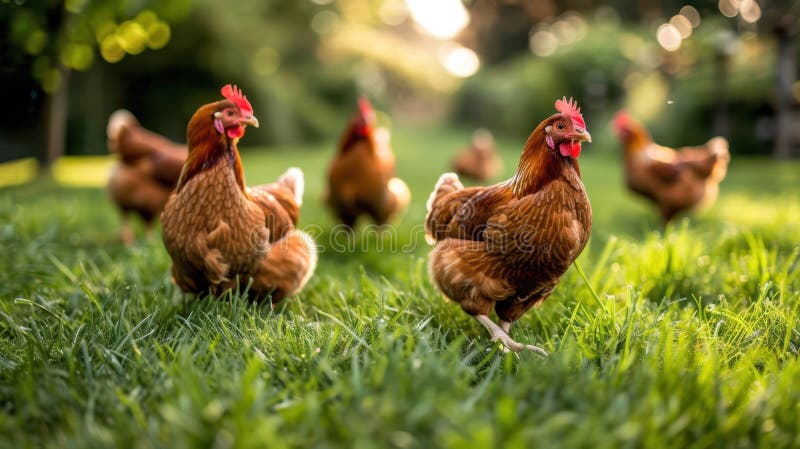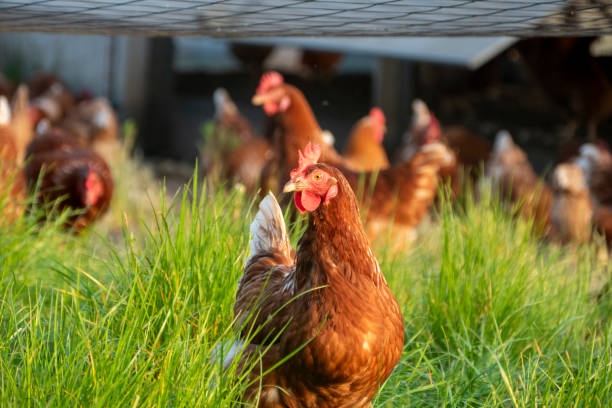
Beyond the Supermarket: Your Guide to Ethically Sourced Poultry
Have you ever tasted chicken that bursts with flavor, a richness you just can't find in the supermarket variety? I remember the first time I tried truly pasture-raised chicken. It was at a potluck, and a neighbor had brought a roasted chicken from their small farm. The difference was astounding. The meat was more succulent, the skin crisper, and the overall flavor was so much deeper. That meal sparked my journey into ethical poultry sourcing, and I’ve never looked back.
Factory farming has become the norm, prioritizing efficiency and low prices at the expense of animal welfare, environmental sustainability, and even the quality of the meat itself. Chickens crammed into tiny cages, fed unnatural diets, and pumped full of antibiotics – it’s a grim picture. But there’s a better way. Choosing ethically raised poultry means supporting farms that prioritize the well-being of their animals, treat the land with respect, and offer a product that is both healthier and tastier.
Sourcing your poultry directly from local farms isn’t just about getting a better meal; it's about supporting your community, knowing where your food comes from, and contributing to a more sustainable food system. In this post, I’ll guide you through the process of finding local farms committed to ethical practices, evaluating their methods, and enjoying the incredible rewards of pasture-raised poultry.

Finding Local Poultry Farms
Discovering farms committed to ethical practices might seem daunting, but it's more accessible than you think. Here's a breakdown of the best resources:
1. Utilizing Online Resources and Directories:
The internet is a powerful tool for connecting with local farmers. Several online directories specialize in listing farms that prioritize sustainable and ethical practices.
- Local Harvest: This website is a comprehensive directory of farms, farmers' markets, and CSAs across the country. You can search specifically for poultry farms in your area.
- Eatwild: Eatwild focuses on farms that raise animals on pasture. Look for poultry farms that emphasize grass-fed or pasture-raised practices.
- Weston A. Price Foundation: This organization promotes nutrient-dense foods and traditional farming practices. Their website often lists local farms that align with their values.
When searching online, be sure to use relevant keywords like "pasture-raised chicken near me," "local poultry farms," or "ethical poultry [your state/region]."
2. Exploring Community Resources:
Don't underestimate the power of community connections.
- Farmers' Markets: Farmers' markets are a great place to meet local farmers face-to-face and learn about their practices. Ask vendors directly about their poultry raising methods and whether you can visit their farm.
- CSAs (Community Supported Agriculture): Some CSAs offer poultry shares or partner with local poultry farms. Joining a CSA is a great way to support local agriculture and receive a regular supply of fresh, ethically raised chicken.
- Word-of-Mouth Referrals: Talk to your neighbors, fellow homesteaders, and friends who are passionate about local food. They may have valuable recommendations for reputable farms in your area.
3. Driving Around and Looking for Signs:
Sometimes, the best way to find local farms is to simply explore your rural areas.
- Take a drive: Set aside an afternoon to drive around the countryside and look for signs advertising poultry, eggs, or other farm products.
- Be respectful: Always be mindful of private property. Only visit farms during designated hours or by appointment. Don't trespass or disturb the animals.
Finding local poultry farms often requires a combination of online research, community involvement, and good old-fashioned exploration.

Evaluating Farm Practices: What to Look For
Once you've identified some potential farms, it's crucial to evaluate their practices to ensure they align with your values. Here are some key factors to consider:
1. Pasture-Raised and Free-Range Systems:
The terms "pasture-raised" and "free-range" can be misleading if not properly understood.
- What it truly means: Pasture-raised chickens should have ample access to pasture, with plenty of space to roam, forage, and express their natural behaviors. Free-range chickens have access to the outdoors, but the quality of the outdoor space can vary greatly.
- Assessing the pasture: Look for healthy grass, adequate space per bird, and access to shade and shelter. A good pasture will be diverse, with different types of grasses and plants.
- Red flags: Be wary of overcrowded conditions, barren landscapes with little or no vegetation, and a lack of sunlight or shelter. These are signs that the birds are not truly being raised in a pasture-based system.
2. Feed and Supplementation:
The diet of the chickens plays a crucial role in the quality of the meat.
- Feed practices: Inquire about the farm's feed practices. Is the feed organic? Is it GMO-free? What percentage of the chicken's diet comes from pasture?
- Antibiotics and hormones: Ethically raised poultry should generally be free of antibiotics and hormones. Ask the farmer directly about their use of these substances.
- Foraging: Pasture-raised chickens should be able to supplement their diet by foraging for insects, worms, and other natural foods. This contributes to the richness and complexity of the meat.
3. Processing Methods:
The way poultry is processed can also impact its quality and ethical considerations.
- On-farm vs. USDA-inspected: Some farms process their poultry on-site, while others use a USDA-inspected facility. Both options can be safe and ethical, but it's important to understand the differences.
- On-farm processing: If the farm processes on-site, inquire about their hygiene and safety practices. Do they follow proper sanitation procedures? Are they licensed to process poultry?
- Humane handling and slaughter: Regardless of the processing method, it's essential to ensure that the chickens are handled and slaughtered humanely.
4. Farm Transparency and Open Communication:
- Willingness to answer questions: A farm that is committed to ethical practices should be open and transparent about its methods. They should be willing to answer your questions and address any concerns you may have.
- Farm tours: If possible, ask if you can visit the farm and see the chickens in their environment. This is the best way to assess their living conditions and the overall quality of the operation.
By asking informed questions, visiting the farm if possible, and looking beyond marketing claims, you can confidently evaluate farm practices and choose poultry that aligns with your values.

Benefits Beyond the Bird: Supporting Local Economies and Sustainable Agriculture
Choosing ethically raised poultry offers benefits far beyond a delicious meal.
1. Supporting the Local Economy:
- Keeps money local: When you buy directly from local farms, your money stays within the community, creating jobs and supporting small businesses.
- Multiplier effect: Local farms often source their supplies from other local businesses, further boosting the local economy.
2. Promoting Sustainable Agriculture:
- Soil health: Pasture-raised poultry can contribute to soil health through manure fertilization and insect control.
- Regenerative agriculture: Ethical poultry farming is often part of a broader regenerative agriculture system, which aims to improve soil health, sequester carbon, and enhance biodiversity.
- Reduced transportation: Buying local reduces the environmental impact of transporting food over long distances.
3. Fostering a Connection to Your Food:
- Knowing your food: Sourcing directly from local farms allows you to know where your food comes from and how it was produced.
- Building relationships: You can build relationships with the farmers who raise your food and learn about their farming methods.
- Personal satisfaction: There's a unique satisfaction in knowing that you're supporting ethical and sustainable farming practices.
Sourcing ethically raised poultry is an investment in a more sustainable and equitable food system, strengthening the local community, and fostering a deeper connection to your food.
![smiling farmer selling poultry farmers market]
Tips for Buying and Storing Your Ethically Sourced Poultry
To make the most of your ethically sourced poultry, keep these tips in mind:
1. Ordering in Advance and Pre-Ordering Options:
- Pre-ordering: It's often necessary to pre-order poultry, especially for seasonal birds like Thanksgiving turkeys.
- Ordering options: Explore different ordering options, such as whole birds, individual parts, or subscription boxes for regular deliveries.
2. Handling and Storing Poultry Safely:
- Preventing cross-contamination: Always wash your hands thoroughly after handling raw poultry and use separate cutting boards and utensils to prevent cross-contamination.
- Thawing methods: Thaw poultry in the refrigerator, in cold water, or in the microwave. Never thaw poultry at room temperature.
- Storage: Store fresh poultry in the refrigerator for no more than two days. For longer storage, freeze the poultry immediately.
3. Making the Most of Your Purchase: Carcass Utilization:
- Bone broth: Don't throw away the carcass! Use it to make delicious and nutritious bone broth.
- Rendering fat: Render the chicken fat for cooking. It's a flavorful and healthy alternative to vegetable oil.
Proper handling, storage, and utilization of your ethically sourced poultry will ensure food safety, maximize its value, and minimize waste.
![whole roasted chicken herbs veggies platter]
A Taste of Something Better
Sourcing ethically raised poultry is a conscious choice that benefits you, the animals, the environment, and the local community. From the superior taste and nutrition to the support for sustainable agriculture, the rewards are immense. Take the first step today towards finding local poultry farms and experiencing the difference for yourself.
I remember the first chicken I roasted that I knew for sure came from happy, healthy hens just a few miles down the road. The smell filled the house, a richer, earthier aroma than I was used to. And the taste? Unforgettable. It wasn't just a meal; it was a connection to the land, the animals, and the people who cared for them. It was a taste of something truly better.
What are you waiting for? Let’s move beyond the supermarket and embrace a more ethical and delicious way to enjoy poultry. Share your experiences and tips in the comments below!
Ready to find local poultry farms near you? Visit Local Harvest to get started!